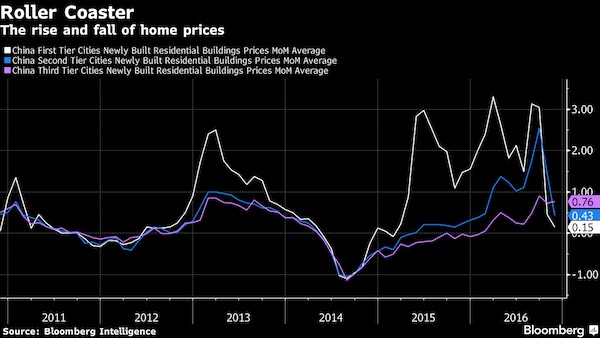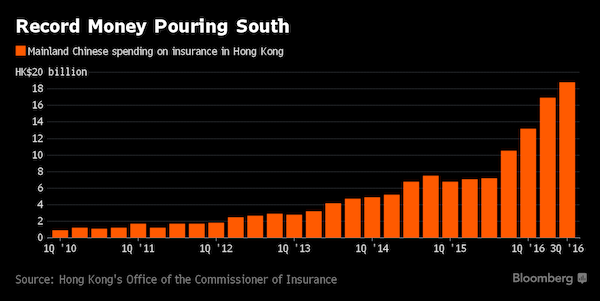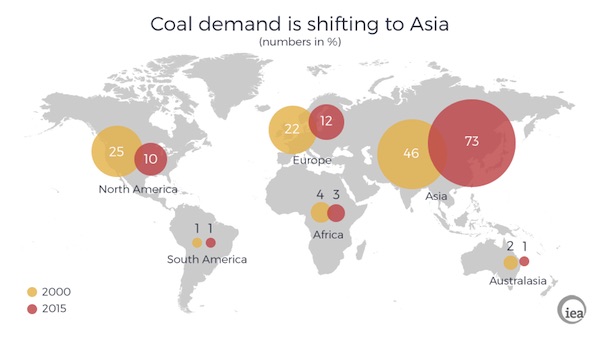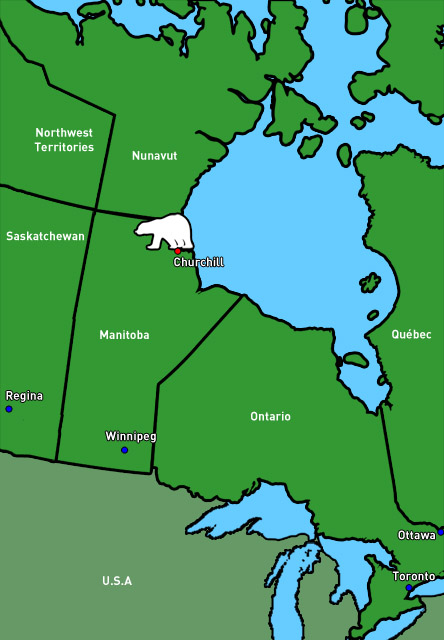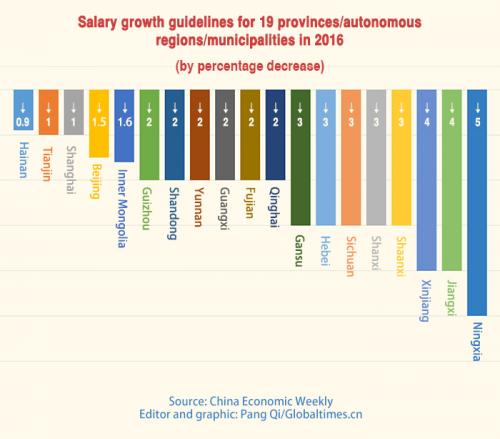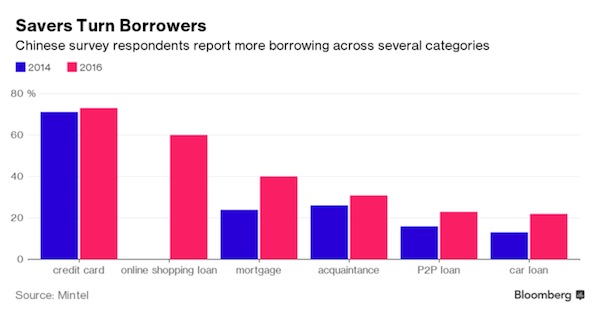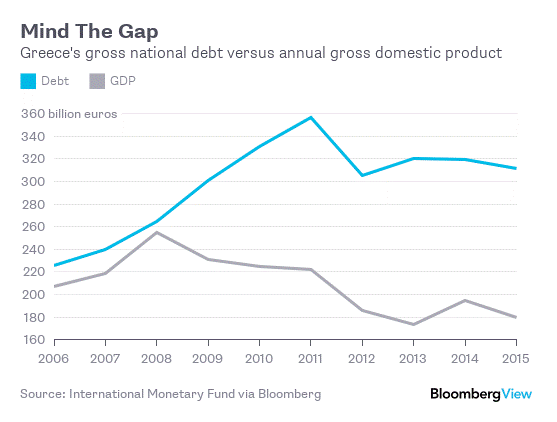
DPC Sternwheeler Mary H. Miller in Mississippi River floating dry dock, Vicksburg 1905



” Financial services alone surged 17.4% in the first six months of 2015..”
• If China Isn’t a Global Risk, What Is? (Pesek)
The international ratings agency Fitch was downplaying concerns on Thursday that Chinese stocks are a systemic risk to global markets. Many investors, however, are far less sanguine. Take hedge fund billionaire Paul Singer, who worries Beijing’s debt-fueled stock mania could do even more damage than the U.S. subprime crisis. Or Bill Ackman, who runs Pershing Square Capital Management. Asked about Greece on Wednesday, he said: “China is a bigger global threat by far. The Chinese stock market is a fairly remarkable phenomenon and I think kind of a frightening one.” Who’s right – Fitch or market players? The deciding factor could be whether deflation rears its head in China – falling prices, and the prospect of a slowing national economy, would suggest the hedge funds are right.
Let’s consider the data. A common takeaway from China’s better-than-expected data this week is that deflation’s grip is easing. The claimed 7% GDP growth rate, rising middle-class incomes and a pickup in credit would seem to augur well for a stable price outlook in the world’s second-biggest economy. But those numbers are deceiving. For starters, China’s second-quarter performance was pumped up by a stock bubble that’s now losing air. Financial-sector growth combined with government stimulus (and some creative accounting, of course) to boost GDP. Financial services alone surged 17.4% in the first six months of 2015, a dynamic that helped offset a weak real estate market. But, given the recent stock rout that wiped out almost $4 trillion in market value, it should be obvious this isn’t a durable source of growth.
Meanwhile, China’s housing slowdown is a major deflationary event. Real estate has been China’s biggest growth engine since the 2008 global crisis. Now, it’s in negative-growth territory. And that’s having knock-on effects for local-government finances and vital sectors like manufacturing. But there’s another deflationary force confronting President Xi Jinping: the fading of China’s credit super-cycle, in which people and businesses tried to borrow their way out of debt problems. “The world-beating growth in debt of recent years is unlikely to be repeated as worries about financial stability grow,” says Andrew Batson, China research director at consulting firm Gavekal Dragonomics. “This creates another barrier to China’s return to rude inflationary health.”
Let’s say China actually did grow 7% between April and June. That’s still markedly slower than the 12% jump in corporate and household borrowing last month. All that borrowing limits the ability of companies to increase employment and consumers to spend. Outstanding loans for companies and households are now a record 207% of GDP (and growing fast), compared with 125% in 2008. While the government is sure to do more to stabilize growth, “we are far from certain that China is about to exit the deflationary dynamic of recent years,” Batson says. While China’s consumer prices rose 1.4% in June, producer prices plunged 4.8%.
Read more …

How crazy are they going to make it before it blows up?
• China’s State-Owned Banks Commit $200 Billion To Stock Rescue (FT)
China’s biggest state-owned banks have lent a combined Rmb1.3tn ($209bn) to the country’s margin finance agency in recent weeks to staunch a free-fall in the stock market, casting doubt on whether the recent market rebound is sustainable without government support. China Securities Finance Corp was established in 2011 to lend to securities brokerages and support margin lending to stock investors. Amid the stock market’s dramatic tumble beginning in late June, however, the government has deployed CSF as a conduit for injecting rescue funds into the stock market, writes Gabriel Wildau in Shanghai. CSF has lent to brokerages to finance their stock investment and has also purchased mutual funds directly. But today’s revelations indicate that state support for the stock market is much larger than previously disclosed.
The Shanghai Composite Index has recovered about 15 per cent since its low point on July 10. The magnitude of state support suggests the rally is largely a government-driven phenomenon. Financial magazine Caijing reported on Friday that the country’s sixth-largest lender by assets, China Merchants Bank, provided the largest single loan, at Rmb186bn. The five largest banks — Industrial and Commercial Bank of China, China Construction Bank, Agricultural Bank of China, Bank of China, and Bank of Communications — each provided more than Rmb100bn. In total, 17 banks provided interbank loans worth around Rmb1.3tn through July 13, the magazine reported. The People’s Bank of China had previously said it was “actively assisting” CSF to obtain liquidity through interbank lending, bond issuance, and other methods. The central later confirmed it had provided loans directly to CSF, without specifying an amount.
Read more …

“..the crucial variable that separates relatively harmless frenzies from disastrous ones is debt.”
• Sorry To Burst Your Bubble: Debt, Not Stock Prices, Most Worrisome (Economist)
When Chinese shares plunged earlier this month, the government tried frantically to limit the damage. It pumped cash into the market, capped short-selling and ordered share buy-backs. Although China was unusually heavy-handed, it was hardly the first country to try to bolster stock prices for fear of the economic harm a crash could bring. Alan Greenspan, as chairman of the Federal Reserve, famously created the “Greenspan put” by giving investors the impression he would cut interest rates to stop stockmarket routs. The underlying rationale for these interventions is an idea that until recently received surprisingly little scrutiny—namely, that stockmarket busts are very damaging for the economy. The link seems clear enough in the case of the crash of 1929, which led in short order to the Depression.
But it is also easy to point to contrary examples. The bursting of America’s dotcom bubble in 2000 wiped out $5 trillion in market value, equivalent to half of GDP. Yet it was followed by a shallow recession. Not all bubbles, it would appear, are equally bad. According to two new papers, the crucial variable that separates relatively harmless frenzies from disastrous ones is debt. In many cases, though certainly not all, stockmarket manias fall into the less worrying category. Writing for the National Bureau of Economic Research, Oscar Jorda, Moritz Schularick and Alan Taylor examine bubbles in housing and equity markets over the past 140 years. The most dangerous, they conclude, are housing bubbles fuelled by credit booms. The least troublesome are equity bubbles that do not rely on debt.
Five years after the bursting of a debt-laden housing bubble, the authors find, GDP per person is nearly 8% lower than after a “normal” recession (ie, one that is not accompanied by a financial crisis). In contrast, five years after a stockmarket crash, GDP per person is only 1% or so lower. If the stock bubble comes alongside a big rise in debt, the damage to GDP per person is 4%. The paper does not explain why housing bubbles are more costly, but a fair inference is that, whereas equity investments tend to be concentrated among the rich, plenty of people lower down the income ladder have wealth tied up in housing.
That makes sense. Stockmarket routs typically harm the economy via the “wealth effect”. When people see that their assets are worth substantially less than before, they spend less, leading to weaker demand and, ultimately, weaker investment. Debt can make this worse. Those who have borrowed to invest may be forced to sell assets to avoid defaulting, further depressing prices and wealth. Banks that have lent to investors or accepted shares as collateral will also suffer losses. That forces them to rein in their lending, harming the economy even more.
Read more …

Ambrose in praise of Schäuble. And he makes a case. The thing is, though, that Greece taking the decision leads to something very different from ‘the others’ doing it.
• Greece Should Seize Germany’s Botched Offer Of A Velvet Grexit (AEP)
One day we will learn the full story of what went on at the top levels of the German government before the villenage of Greece last weekend. We already know that the EMU accord – if that is the right word – is an economic and diplomatic fiasco of the first order. It does serious damage to the moral credibility of the EU but resolves nothing. There is not the slightest chance that Greece will be able stabilize its debt and return to viability under the Carthaginian settlement imposed on Alexis Tsipras – after 17 hours of psychological “water-boarding”, as one EU official put it. The latest paper by the IMF has torn away the fig-leaf. The country needs a 30-year moratorium on debt payments and probably outright subsidies to recover from the devastation of the past six years. Instead it gets pro-cyclical fiscal contraction of 2pc of GDP by next year.
Some are already comparing the terms to the Versailles Treaty but this does not quite capture the depravity of it. The demands imposed on Germany in 1919 were certainly vindictive and narrow-minded – as Keynes rightly alleged – but they were not, on the face of it, beyond reach. France was forced to pay reparations after the Franco-Prussian War in 1871 that were roughly equivalent to Versailles, albeit in very different circumstances. It dutifully did so, while plotting revenge. What Greece is being asked to do is scientifically impossible. Almost everybody involved in the talks knows this. Yet the lie goes on because the dysfunctional nature of EMU politics and governance makes it impossible to come clean. The country is dishonestly kept in a permanent state of crisis.
Wolfgang Schauble is one of the very few figures who has behaved honourably in this latest chapter. As readers know, I have been highly critical of the hard-bitten finance minister for a long time, holding him directly responsible for the 1930s regime of debt-deflation and contraction imposed on much of Europe, and for refusing to accept that the eurozone’s North-South divide must be closed by both sides. Any policy that puts all the burden of adjustment on the South is destructive and doomed to failure. But he is entirely right to argue that a velvet divorce and an orderly exit from the euro for five years would be a “better way” for Greece, as he did on Germany radio this morning. It would allow the country to regain competitiveness at a stroke without a disastrous over-shoot or the risk that events might spin out of control. It would clear the way for proper debt relief – or a standard IMF-style package.
If accompanied by some sort of Marshall Plan or investment blitz – as Mr Schauble appears to favour – it would set the foundations for genuine recovery. Huge sums of Greek money sitting on the sidelines would probably flood back into the country once the Grexit boil had been lanced. It is a pattern seen time and again in emerging markets across the world over the past 60 years. Instead, total confusion remains. “Nobody knows at the moment how this is supposed to work without a haircut and everybody knows that a haircut is incompatible with euro membership,” said Mr Schauble. To those who say that Grexit would violate the sanctity of monetary union – with incalculable political consequences – one can only reply that it is already too late.
Read more …

She was party to that plan, remember?
• IMF’s Lagarde: Greek Plan ‘Categorically’ Not Viable (FT)
The head of the IMF said eurozone creditors’ plan for Greece is “categorically” not viable without a reduction in debt. Speaking on France’s Europe1 Radio from Washington, Christine Lagarde reiterated that Greece needs debt relief. She wouldn’t say what amount of relief Greece would need, but said the current plan isn’t viable. Ms Lagarde said the IMF will participate in a “complete” bailout package. She will support a significant extension on Greek debt maturities and reimbursement deadlines. The long-term aim is that Greece returns to the market. Ms Lagarde’s comments echo those call from ECB president Mario Draghi yesterday. He said debt relief is “uncontroversial” and the only question is “what form this takes.” Greek banks are tentatively set to re-open on Monday after the ECB said it would raise its emergency loans to them by €900m, though it’s not yet a done deal.
Read more …

It’s already dead.
• The Crucifixion Of Greece Is Killing The European Project (Guardian)
You couldn’t have had a clearer demonstration of what democracy now counts for in Europe than this week’s immolation of Greece. In January, after five years of grinding austerity imposed by the troika of creditors had shrunk its economy by a quarter and pushed millions into poverty, Greeks rebelled and elected an anti-austerity government. Following months of fruitless negotiations, the country voted last week to reject the latest cuts, tax rises and privatisations demanded to deal with the disastrous impact of the first phase of austerity. The response of the eurozone’s masters was immediately to ratchet up the pain still further. For the “breach of trust” of daring to put the terms to its people, Athens was to be punished.
So on Monday – threatened with expulsion from the eurozone and economic collapse courtesy of the ECB’s cash blockade – the Greek prime minister, Alexis Tsipras, bent the knee. In exchange for what is called a bailout, but is in reality the imposition of new debts to pay existing creditors, the Greeks must hand over €50bn of public assets to an “independent” privatisation fund. On top of that, they have to inject more austerity into a shrinking economy and reverse any legislation deemed unsuitable by the eurozone’s overlords – in other words, the opposite of everything Tsipras and his Syriza party were elected to do. That’s why European officials were so keen to let it be known that Tsipras had been “crucified” and “mentally waterboarded”.
Greece would be turned into an economic “protectorate”, one purred, where all key decisions would be taken by foreign governments and unelected EU bureaucrats. No wonder Greek leaders declared that they had been subjected to a coup, while the ex-finance minister Yanis Varoufakis compared the “deal” to the Versailles treaty. This is the diktat of a bankers’ ramp that can barely tolerate even a facade of democracy. That’s been a familiar pattern in the developing world for decades, in the guise of IMF and World Bank structural adjustment programmes. But the eurozone has now given it permanent institutional form. The idea that this crisis has simply pitted one democratic mandate – that of Greece – against the hard-pressed taxpayers of 18 other eurozone members is nonsense.
Not only have the loans that bailed out French and German lenders, rather than Greece, been highly profitable. But the real fear of eurozone governments is that if Greece’s rebellion against austerity is rewarded, other European electorates will want to go the same way. Which is why Syriza must not only be defeated, but utterly crushed. That this is about politics more than economics should now be obvious. It’s not just that the austerity imposed on Greece has delivered a 1930s-style depression, or that Ukraine was recently bailed out with generous debt write-offs but without any crucifixions or waterboarding.
Read more …

“..cannot be understood as anything other an act of punishment against a leftwing government.”
• Merkel ‘Gambling Away’ Germany’s Reputation Over Greece – Habermas (Guardian)
Jürgen Habermas, one of the intellectual figureheads of European integration, has launched a withering attack on the German chancellor, Angela Merkel, accusing her of “gambling away” the efforts of previous generations to rebuild the country’s postwar reputation with her hardline stance on Greece. Speaking about the bailout deal for the first time since it was presented on Monday, the philosopher and sociologist said the German chancellor had effectively carried out “an act of punishment” against the leftwing government of Alexis Tsipras. “I fear that the German government, including its social democratic faction, have gambled away in one night all the political capital that a better Germany had accumulated in half a century,” he told the Guardian.
Previous German governments, he said, had displayed “greater political sensitivity and a post-national mentality”. Habermas, widely considered one of the most influential contemporary European intellectuals, said that by threatening Greece with an exit from the eurozone over the course of the negotiations, Germany had “unashamedly revealed itself as Europe’s chief disciplinarian and for the first time openly made a claim for German hegemony in Europe.” The outcome of the negotiations between Greece and the other eurozone member states, he said, did “not make sense in economic terms because of the toxic mixture of necessary structural reforms of state and economy with further neoliberal impositions that will completely discourage an exhausted Greek population and kill any impetus to growth.”
Habermas added: “Forcing the Greek government to agree to an economically questionable, predominantly symbolic privatisation fund cannot be understood as anything other an act of punishment against a leftwing government.” The Düsseldorf-born philosopher, a former assistant of the prominent Frankfurt School theorist Theodor Adorno, rose to prominence during the student protests in the late 1960s. His works on the establishment of a pan-European political and cultural identity, such as Structural Transformation of the Public Sphere, went on to influence and shape policy debate around the European Union. At the start of the millennium, Habermas was one of the leading drivers behind calls for a European constitution.
Read more …

“..whose 70% approval rating makes him more popular than German Chancellor Angela Merkel..”
• Germany’s Schäuble Deeply Skeptical Of Greek Plan (WSJ)
German Finance Minister Wolfgang Schäuble said Thursday he didn’t see how a bailout plan for Greece that he helped negotiate could work. Hours later, he asked parliament to pave the way for it anyway. The increasingly outspoken skepticism from the powerful and hawkish Mr. Schäuble has emerged as perhaps the clearest signal this week that even though eurozone officials have agreed to try to rescue Greece, the country’s future in the eurozone is by no means assured. For Mr. Schäuble, a 72-year-old conservative political veteran whose 70% approval rating makes him more popular than German Chancellor Angela Merkel, one problem is Greece’s heavy debt load.
While officials from Greece, France, and the IMF have already warned that Greece’s debt is unsustainable, Mr. Schäuble went further on Thursday and said this high debt load may force Greece to exit the euro. The reason, he said in a German radio interview, is that debt relief for Greece by its creditors—Germany is the biggest—may violate a European Union treaty that prohibits one eurozone country’s debt burden to be shared with others. He suggested Greece may be better off leaving the euro, which would allow its creditors to write down its debt.
“No one knows at the moment how this is supposed to work without a debt haircut, and everyone knows that a debt haircut is incompatible with membership in the monetary union,” Mr. Schäuble said on public radio. “One will try to find a solution. I don’t see it yet, but we are starting with the negotiations and don’t know what the outcome of the negotiations will be.”
Read more …

Angela Lecter.
• Greece Bailout Revives Image Of The ‘Cruel German’ (WaPo)
A divided Germany rose from the ashes of the Nazi defeat in World War II, weathering the Cold War to transform into one of the good guys. Modern Germany quickly molded itself into the standard-bearer of global pacifism, a hotbed of youth culture and the tree-hugging Lorax of nations in the fight against climate change. But, just like that, the image of the “cruel German” is back. Germany — more specifically, its chancellor, Angela Merkel — has faced years of derision for driving a hard bargain with financially broken Greece, which has received billions in bailouts since 2010. But for both Germany and Merkel, the concessions extracted this week to open fresh rescue talks with Athens appear to have struck a global nerve.
By insisting on years more of tough cuts and making other demands that critics have billed as humiliating, Berlin is wiping out decades of hard-won goodwill. In the aftermath of the deal with Greece, the hashtag #Boycottgermany — calling on users not to buy German products — has started trending on Twitter. Referencing Hannibal Lecter, the cannibal from “Silence of the Lambs,” Europeans are sharing caricatures depicting Merkel as a Greece-eating “Angela Lecter.” A cartoon portraying Wolfgang Schäuble — Merkel’s even-harder-line finance minister — as a knife-wielding killer from the Islamic State militant group has gone viral. Germany was one of more than a dozen nations that insisted on a tough deal with Greece. But Britain’s Daily Mail singled out Germany, saying Greece had surrendered to austerity “with a German gun at his head.”
In the United States, New York Times columnist Paul Krugman this week noted the hate mail he had received from Germany for repeatedly criticizing its tough line on fiscal reforms. The Germans, he wrote, had suggested that as a Jew, he should know “the dangers of demonizing a people.” To that, Krugman responded with sarcasm: “Because criticizing a nation’s economic ideology is just like declaring its people subhuman.” In Greece, those actively supporting the austerity deal are being heckled by their countrymen as “Nazi collaborators.” Another image making the rounds on social media shows a doctored version of the European Union flag, its circle of gold stars against a blue background reshaped into a swastika.
France’s daily Le Figaro declared that “conditions were imposed on a small member state that would have previously required arms.” In a commentary that sneered at Merkel’s “half smile” after the deal was reached, Britain’s Guardian newspaper argued that rather than being cruel to be kind, the terms of the bailout were simply “cruel to be cruel.”
Read more …

Discussion ongoing.
• Germany Offers Verdict on Greek Aid After Draghi Backing (Bloomberg)
German lawmakers have their say on Greece’s next bailout on Friday after ECB President Mario Draghi said he views the country’s place in the euro as secure. As Europe seeks to line up a three-year aid package worth as much as €86 billion, the lower-house vote is a renewed test of Chancellor Angela Merkel’s struggle to persuade Germans that Greece is still worth helping. While her majority in parliament suggests that passage is assured, Merkel faces growing dissent in her party bloc as she seeks approval to start bailout talks and for a bridge loan to Greece. With the European project under threat, the continent’s most powerful leader is putting her prestige on the line to hold the currency union together.
“The systemic importance of Greece for the entire euro zone hasn’t been demonstrated,” Christian von Stetten, a member of Merkel’s Christian Democratic Union, said Thursday. “There can only be one vote tomorrow, and that is no.” German lawmakers are interrupting their summer recess to return to Berlin for a three-hour floor debate before voting at about 1 p.m. local time. Finland’s parliament gave its approval Thursday. In a closed-door test poll after an appeal for support by Merkel, 48 members of her 310-strong caucus said they would break ranks and vote against the government line, a party official said. That compares with 29 who dissented in February on a vote to extend Greece’s second bailout.
With the IMF urging a debt writedown for Greece that Germany says is impossible under euro rules, Draghi stepped in with an attempt to ease tension. Months of standoffs over aid and austerity between Prime Minister Alexis Tsipras and creditors have led to deposit flight and capital controls, pushing Greece to the brink. “We always acted on the assumption that Greece will remain a member of the euro area,” Draghi told reporters in Frankfurt on Thursday after ECB policy makers granted Greek lenders more emergency liquidity. “There was never a question.”
Read more …

Counting the days.
• EU Said to Agree On Balance to €7 Billion Greece Loan (Bloomberg)
Euro-area finance ministers authorized a €7 billion bridge loan to Greece, according to Irish Prime Minister Enda Kenny, paving the way for a third bailout that may allow Europe’s most indebted nation to stay in the common currency. The financing deal is expected to be announced on Friday after national parliaments have voted on the aid accord that Prime Minister Alexis Tsipras pushed through his legislature on Monday, according to an official with knowledge of the discussion, who asked not to be named because the talks are private. Member states also must consider whether to move ahead with the full bailout proposed for Greece. The short-term financing is needed so that Greece can meet a €3.5 billion payment due to the ECB on Monday, and keep the country afloat while Tsipras negotiates the details of a three-year bailout of as much as €86 billion.
That aid package would come from the euro-area’s permanent firewall fund, the European Stability Mechanism. “I would expect that Mario Draghi will consider now turning on the tap to some extent of emergency liquidity to keep the banks in Greece having money for their customers,” Kenny said in an interview with Irish broadcaster RTE, referring to the president of the ECB. The bridge loan will come from the European Financial Stabilisation Mechanism, the European Union’s rescue fund, the official said. The EU is still working on safeguards to shield non-euro nations from Greek bailout risk, European Commission spokeswoman Annika Breidthardt told reporters in Brussels.
Read more …

“Draghi also took the opportunity to join the IMF in singing from the debt-relief hymnal.”
• Mario Draghi Issues A Resounding Indictment Of The ‘Fragile Euro’ (MarketWatch)
Whatever happened to doing “whatever it takes?” That was ECB President Mario Draghi’s pledge to hold the European shared currency together back in 2012, as the market was panicking about the possibility that a fiscally stressed European country might be forced out of the bloc. While Draghi had previously proclaimed that the euro was “irreversible,” the ECB chief’s comments on Thursday were much less emphatic, with Draghi stating that it wasn’t up to the central bank to determine whether or not Greece remains part of the shared currency. “This is a damning indictment of Europe’s single currency area from the individual who almost single-handedly averted a breakup of the bloc three years ago,” Nicholas Spiro, managing director of Spiro Sovereign Strategy, a London-based advisory firm, in a note.
Had Draghi talked similarly in 2012, “all hell would have broken loose in the markets,” Spiro said. On Thursday, the market either didn’t notice Draghi’s rhetorical shift or didn’t care to fret about it, with the focus squarely on shoring up Greece’s teetering banking sector. According to a tally by Danske Bank, 18 out of the 23 questions Draghi took during his news conference were about Greece. Draghi used the opportunity to emphasize that the ECB always operated under the assumption that Greece would remain a part of the euro. The most crucial news was the ECB president’s decision to raise emergency liquidity assistance to Greek banks by €900 million without toughening the rules governing the collateral the banks must post in return for the funding.
That gives Greek banks, which have been closed for more than two weeks, some breathing room, though capital controls are likely to remain in place for some time. The move was a recognition of the Greek parliament’s approval of the tough austerity measures demanded in return for a third bailout, as well as the agreement in principle by eurozone governments on a bridge loan that will tide Greece over until its bailout is up and running—and would allow Greece to make a €3.5 billion repayment due on July 20. “The decision to grant bridge financing as well as today’s ECB decision to increase ELA are no game-changer, yet, but at least a symbolic leap of faith,” said Carsten Brzeski, eurozone economist at ING in Brussels
The ECB bought Greece more time with its decision to raise the amount of emergency liquidity available to the country’s banks, but Draghi used his bully pulpit to give Greece a vote of confidence while simultaneously highlighting the euro’s deep design flaws. Draghi described the monetary union as “imperfect, and being imperfect is fragile, vulnerable and doesn’t deliver…all the benefits that it could if it were to be completed.” Draghi said the situation underscored the need for further economic and political integration in the eurozone.
Draghi also took the opportunity to join the IMF in singing from the debt-relief hymnal. Draghi told reporters that the concept of debt relief has always been “uncontroversial” and that the only question has been about how to accomplish it within Europe’s legal framework. The IMF has argued that Greece’s debt load is unsustainable and must be trimmed, signaling it could walk away from a third bailout if debt relief isn’t offered. Germany, meanwhile, has insisted that the scope for debt relief within the rules governing the eurozone is very limited.
Read more …

These people could be paid in an alternate currency.
• Greek Cleaners Swept Out Of Work After Tsipras U-Turn (FT)
For Vagelis Alexiou, the socialist revolution led by Alexis Tsipras lasted just 12 wonderful days. Turfed out of his job as a cleaner in Greece’s ministry of finance two and a half years ago by a cost-cutting government following orders from the country’s creditors, Mr Alexiou was reinstated on July 1 by a decree passed by Mr Tsipras’ ruling leftwing Syriza party. But the Greek prime minister’s defiance, and Mr Alexiou’s wish to return to his job mopping the floors of the ministry, ended on Monday as Athens capitulated to creditors’ demands for further austerity and economic reform in exchange for a desperately needed €86bn bailout. “I wish Mr Tsipras had said no to Brussels,” says Mr Alexiou, sitting outside the ministry in central Athens, his hope of being rehired now in tatters.
“I hope we can still trust him. He wants to help the workers, the poor people . . . but the creditors will not let him.” Swept to power in January by Greeks tired and angry after five years of punishing austerity, Mr Tsipras promised an end to cost-cutting and the legislative oversight from the EU, ECB and IMF, together with a repeal of measures taken by previous governments that slashed public sector jobs and wages. Those hopes ended in the early hours of Monday morning after 17 hours of bruising negotiations in Brussels, when Greece’s prime minister agreed to the most intrusive reform and austerity program ever demanded by the EU in exchange for cash to keep his county from going bankrupt and exiting the euro zone.
Read more …

Everyone but Greece can apply. What about Russia?
• ECB Puts In Place Secret Credit Lines With Bulgaria And Romania (FT)
The ECB has introduced secret credit lines to Bulgaria and Romania as part of a broader effort to convince foreign regulators not to pull the plug on the local subsidiaries of Greek banks. News of the behind-the-scenes support for the subsidiaries came as ECB governors decided on Thursday to give an extra €900m in emergency funds to Greece’s beleaguered financial sector, a marginal increase to the $89bn in emergency funding it already had. Greece’s Piraeus, National Bank of Greece, Eurobank and Alpha Bank all have substantial assets in central and eastern Europe. If those assets were seized by local regulators, the parent banks would take an immediate capital hit, dealing a potentially terminal blow to Greece’s domestic financial system, which is already hanging by a thread as the country battles to agree a new rescue package with international creditors.
“The fear is that if someone goes first, and pulls the plug, everyone will follow,” said a person familiar with the situation. The person said the ECB had put in place special “swap” arrangements, or bilateral credit lines, with Romania and Bulgaria to reassure them that the Greek banks there would have funding support throughout the current crisis. Similar swap lines, which enable foreign central banks to borrow from the ECB and re-lend that money locally, were used during the eurozone financial crisis, but were typically publicly announced. An official confirmed the existence of the facilities and said they were created to prevent national central banks from doing anything “hastily” and to reassure them that the ECB would be the lender of last resort if the Greek offshoots ran into trouble.
Read more …

We already know not all banks will open.
• New ECB Cash Lifeline Could Reopen Greek Banks on Monday (Guardian)
Banks in Greece could open their doors on Monday for the first time in three weeks, after the ECB boosted emergency funding for the country’s financial sector by €900m (£630m) and threw its weight behind calls for debt relief for Athens. The ECB president, Mario Draghi, announced the extension of aid to the country’s banks while backing the idea – championed by the IMF but rejected by Germany – that some of Greece’s debts will have to be written off. “It’s uncontroversial that debt relief is necessary and I think that nobody has ever disputed that. The issue is what is the best form of debt relief within our framework, within our legal institutional framework,” said Draghi. “I think we should focus on this point in the coming weeks.”
The ECB’s decision to ease the plight of Greece’s banking system came after the Greek prime minister, Alexis Tsipras, won a crucial parliamentary vote backing the spending cuts and economic reforms he has pledged to implement in exchange for opening talks on an €86bn bailout. The European commission, one of three creditors to Greece along with the IMF and the ECB, also announced it had put together a €7bn bridging loan for Athens. As part of this short-term financing package, George Osborne has backed down over the use of the EU’s bailout fund, the European Financial Stabilisation Mechanism, to finance Greece’s short-term needs. However, the chancellor said there would be an “impregnable ringfence” around the £850m of British money in the fund to prevent any losses to the UK taxpayer.
Speaking after the deal, Osborne said it was a “significant victory and strengthened the protections for the UK in the latest Greek bailout and any future bailouts of eurozone countries”. He added: “I said British taxpayers’ money would not be on the line in any agreement and that’s precisely what we have achieved.” In the event of a default by Greece, non-eurozone countries would be compensated using the profits made on holdings of Greek bonds by the ECB. The head of the Eurogroup, Jeroen Dijsselbloem, said the €7bn financing package was in place and inspectors from the IMF could fly to Athens as early as Monday to oversee implementation of the reform programme.
Read more …

This is what the Greek people should be asked: Do you want Europe/Germany to own your whole country outright, including its banks?
• Saving Greece’s Banks Could Mean a Full European Takeover (WSJ)
To save its banks, Greece may need to let them go. Doing so would help the economy, but would hand control of the financial sector to eurozone leaders. Two things are needed to give the banks a chance of recovering. First, bad assets must be dealt with and capital increased. Second, links with the Greek state must be severed. Both can be achieved in one action: direct recapitalization of the system with European funds. This may be what eurozone leaders had in mind in bailout proposals that include €25 billion ($27.4 billion) for Greece’s banks. The ECB extended emergency funding on Thursday, but this only relieves a little pressure. Greece’s banks are running out of collateral to swap for extra funds: They could have as little as €8 billion to €10 billion worth, according to a Greek banking executive.
And even if banks can reopen to process certain transactions, withdrawal limits and capital controls will remain in place for some time. The longer they do, the worse the effect on the economy and bank solvency will be. Some or all of Greece’s big-four banks, in which the government holds substantial stakes, are likely to need recapitalizing. Greece has been told it must put into law by next week the European rules that dictate how shareholders and private creditors must bear losses. Until it does so, it can’t get money for its banks from the European Stability Mechanism, the body that supports cash-strapped countries.
The rules do allow public money to be used in shoring-up banks, but usually only after private investors have taken losses. However, public money can be used earlier where private losses would hit depositors and threaten the economy. This is a significant danger for Greek banks because they have relatively weak capital, high levels of bad loans and very little in the way of bonds that can take losses before depositors. Last year, the stability mechanism was itself given the power to put money directly into eurozone banks alongside member countries. If a country can’t afford to put money in, it can recapitalize banks alone.
Read more …

The last guard before fascists take over?!
• Protest Parties Can Halt Unrest Amid Greek Crisis – Beppe Grillo (Bloomberg)
European anti-establishment parties are the best alternative to halt social unrest as the outcome of the Greek crisis boosts discontent with austerity policies, said Italy’s Five Star founder Beppe Grillo. European institutions are “waffling as they see they are losing support of millions of people saying: ‘We want a Plan B,’” Grillo said Tuesday in an interview in Sardinia. Groups sharing Five Star’s anti-corruption drive and backing so-called bottom-up democracy such as Pablo Iglesias’s Podemos in Spain “are rising as people see them as an alternative,” he said. Greek Prime Minister Alexis Tsipras’s capitulation to the euro region’s creditors this week sent a signal to European critics of austerity that they need to double their efforts.
Their success may lead to new shocks in the region’s political establishment during the next elections, such as in Spain later this year, and again call into question euro-area budget rules. Grillo, who wants Italy to exit the euro and has proposed a referendum on the issue, says ruling parties are unable to counter possible social unrest and the recent surge of far-right movements such as Golden Dawn in Greece. “Golden Dawn has been the symptom of a European nationalism that speaks to people’s instincts,” said Grillo, 66, the founder of Italy’s second-largest party. “Golden Dawn didn’t make it in countries like ours because we worked as a buffer absorbing people’s anger, but that may come now as I expect social unrest, not only in Greece.”
As the Greek deal was announced on Monday, leaders of the Five Star movement lost no time in leading fresh attacks against the euro area’s focus on fiscal discipline. Grillo said in a blog post that day the accord was an “humiliation” for Greece. “We were very surprised” by the outcome, said comedian-turned-politician Grillo, who was in Athens earlier this month to back Tsipras’s call for a “no” vote in the referendum on the creditor’s previous bailout proposal. Grillo, whose Five Star Movement counts 127 lawmakers in the country’s 951-seat parliament’s houses, said the non-binding referendum he proposes would be simpler than the Greek one. “If people will say ‘yes,’ we will stay, otherwise we will exit the euro,” he said. Still, reaching that goal is very difficult because two thirds of the Rome-based Parliament would have to agree to hold the vote.
Read more …

Makes a lot of sense. But no common currency at all even more.
• Germany, Not Greece, Should Exit the Euro (Ashoka Mody)
The latest round of wrangling between Greece and its European creditors has demonstrated yet again that countries with such disparate economies should never have entered a currency union. It would be better for all involved, though, if Germany rather than Greece were the first to exit. After months of grueling negotiations, recriminations and reversals, it’s hard to see any winners. The deal Greece reached with its creditors – if it lasts – pursues the same economic strategy that has failed repeatedly to heal the country. Greeks will get more of the brutal belt-tightening that they voted against. The creditors will probably see even less of their money than they would with a package of reduced austerity and immediate debt relief. That said, the lead creditor, Germany, has done Europe a service.
By proposing the Greece exit the euro, it has broken a political taboo. For decades, politicians have peddled the common currency as a symbol of European unity, despite the flawed economics pointed out as far back as 1971 by the Cambridge professor Nicholas Kaldor. That changed on July 11, when European finance ministers agreed that it could be both sensible and practical for a member country to leave. “In case no agreement can be reached,” they said, “Greece should be offered swift negotiations for a time-out.” Now that the idea of exit is in the air, though, it’s worth thinking beyond the current political reality and considering who should go. Were Greece to leave, possibly followed by Portugal and Italy in the subsequent years, the countries’ new currencies would fall sharply in value.
This would leave them unable to pay debts in euros, triggering cascading defaults. Although the currency depreciation would eventually make them more competitive, the economic pain would be prolonged and would inevitably extend beyond their borders. If, however, Germany left the euro area – as influential people including Citadel founder Kenneth Griffin, University of Chicago economist Anil Kashyap and the investor George Soros have suggested – there really would be no losers. A German return to the deutsche mark would cause the value of the euro to fall immediately, giving countries in Europe’s periphery a much-needed boost in competitiveness.
Italy and Portugal have about the same GDP today as when the euro was introduced, and the Greek economy, having briefly soared, is now in danger of falling below its starting point. A weaker euro would give them a chance to jump-start growth. If, as would be likely, the Netherlands, Belgium, Austria and Finland followed Germany’s lead, perhaps to form a new currency bloc, the euro would depreciate even further.
Read more …

The sordid details.
• How Goldman Sachs Profited From the Greek Debt Crisis (Robert Reich)
The Greek debt crisis offers another illustration of Wall Street’s powers of persuasion and predation, although the Street is missing from most accounts. The crisis was exacerbated years ago by a deal with Goldman Sachs, engineered by Goldman’s current CEO, Lloyd Blankfein. Blankfein and his Goldman team helped Greece hide the true extent of its debt, and in the process almost doubled it. And just as with the American subprime crisis, and the current plight of many American cities, Wall Street’s predatory lending played an important although little-recognized role. In 2001, Greece was looking for ways to disguise its mounting financial troubles. The Maastricht Treaty required all eurozone member states to show improvement in their public finances, but Greece was heading in the wrong direction.
Then Goldman Sachs came to the rescue, arranging a secret loan of €2.8 billion for Greece, disguised as an off-the-books “cross-currency swap”—a complicated transaction in which Greece’s foreign-currency debt was converted into a domestic-currency obligation using a fictitious market exchange rate. As a result, about 2% of Greece’s debt magically disappeared from its national accounts. Christoforos Sardelis, then head of Greece’s Public Debt Management Agency, later described the deal to Bloomberg as “a very sexy story between two sinners.” For its services, Goldman received a whopping 600 million euros ($793 million), according to Spyros Papanicolaou, who took over from Sardelis in 2005. That came to about 12% of Goldman’s revenue from its giant trading and principal-investments unit in 2001—which posted record sales that year. The unit was run by Blankfein.
Then the deal turned sour. After the 9/11 attacks, bond yields plunged, resulting in a big loss for Greece because of the formula Goldman had used to compute the country’s debt repayments under the swap. By 2005, Greece owed almost double what it had put into the deal, pushing its off-the-books debt from €2.8 billion to €5.1 billion. In 2005, the deal was restructured and that €5.1 billion in debt locked in. Perhaps not incidentally, Mario Draghi, now head of the ECB and a major player in the current Greek drama, was then managing director of Goldman’s international division. Greece wasn’t the only sinner. Until 2008, European Union accounting rules allowed member nations to manage their debt with so-called off-market rates in swaps, pushed by Goldman and other Wall Street banks.
In the late 1990s, JPMorgan enabled Italy to hide its debt by swapping currency at a favorable exchange rate, thereby committing Italy to future payments that didn’t appear on its national accounts as future liabilities. But Greece was in the worst shape, and Goldman was the biggest enabler. Undoubtedly, Greece suffers from years of corruption and tax avoidance by its wealthy. But Goldman wasn’t an innocent bystander: It padded its profits by leveraging Greece to the hilt—along with much of the rest of the global economy. Other Wall Street banks did the same. When the bubble burst, all that leveraging pulled the world economy to its knees. Even with the global economy reeling from Wall Street’s excesses, Goldman offered Greece another gimmick. In early November 2009, three months before the country’s debt crisis became global news, a Goldman team proposed a financial instrument that would push the debt from Greece’s healthcare system far into the future. This time, though, Greece didn’t bite.
Read more …

Yes, it is. Just not for the immediate victims.
• The Powerful Have Shown A Really Nasty Side This Month: Great! (Ben Phillips)
In the Addis talks over tackling tax dodging, and in the EU-IMF talks on Euro-austerity, the powerful have shown a really nasty side this month. That’s great news. How can I say that when we see the suffering that this will cause? How could be I so heartless as to see the opportunity in the crisis? Of course I don’t mean that the suffering is a price worth paying, or even that suffering should be necessary to social change. I only mean this: the suffering has been happening. What has been happening less is the powerful showing how deliberate their actions are. Now we see it. It’s the difference between brutality that has been caught on a cameraphone and broadcast on youtube, and brutality hidden behind a wall.
Events in Addis and in Athens show how business as usual works, who dominates it, and its emptiness. It’s not hidden anymore. As Gandhi noted, first they ignore you, then they laugh at you, then they fight you, then you win. We’ve got to stage three. In the EU-IMF talks on Euro-austerity, we know that terms have been imposed on Greece that aren’t deliverable. We know this because the IMF’s own documents say so. In the Addis talks, we know that the reason we don’t have a global tax body to tackle tax dodging is because the rich countries blocked it – not that people looked at it and decided on a better way, but that poor countries proposed it and rich countries blocked it. We may wish that the powerful were not like that – but if they are it is better that we know that they are.
What Addis showed is there is no reliable “global leadership” from the great powers of the North. Southern government assertiveness, backed up by South-North civil society solidarity, will be key. That’s how we stopped the steamroller of the WTO. As we look at how to tackle inequality and how to combat climate change, it is clear that we are not all on the same side. Sometimes pushing a rock up a hill is hard because it’s a rock and it’s a hill. But sometimes it’s even harder because someone at the top is trying to push that rock back down the hill.
But what’s also clear is this. The powerful don’t usually like having to show the force behind their power except when they actually have to. As social theorists from Gramsci to Chomsky have pointed out, things run much smoother for those in power when there is a semblance of process and consent. That the type of power shown over the Addis talks and the Greece talks has been so nakedly brutal is paradoxically a sign of its weakness. This is what Martin Luther King noted in the struggle for civil rights. We’re relearning it now.
Read more …

Pension funds all over did deeper into trouble. Despite the stock market gains. Setting up for a bloodbath.
• US State Pension Funds Face $1 Trillion Funding Gap (Yahoo)
More depressing news for workers who depend on a pension to fund their retirement: State-run pension funds faced a $968 billion shortfall in 2013, up $54 billion from the year prior, according to a new report by The Pew Charitable Trusts. When local pension fund shortfalls are factored in, the total pension funding gap surpasses $1 trillion. “Policy makers are going to need to find a way to address [this funding gap] and it’s going to have to come down to some kind of plan to pay it down in an orderly fashion,” said David Draine, a senior researcher at Pew Charitable Trusts. On average, state pension plans were only 74% funded. The implications for workers are huge.
If states don’t find a way to fully fund pension plans, many workers who have dutifully paid into pension plans may not get back what they’ve put in and young workers may not get to participate at all. Fewer than half of states were able to meet their required annual contributions to pension funds in 2013. New Jersey and Pennsylvania were the furthest behind— each was only able to make only half its annual funding contribution. As a result, more than one-third of their state pension funds were unfunded. Overall funding rates were the worst in Illinois (with just 39% funded) and Kentucky (44%), where pension funding levels have declined for three years in a row. Just two states managed to finish the year with 100%-funded pensions: South Dakota and Wisconsin.
It should be noted that Pew’s report only looks at funding rates for 2013 and does not factor in the significant investment gains of 2014 (the S&P 500 index rose around 11% last year, according to data from FactSet). But even if it had, the budget shortfall would still likely exceed $900 billion, the report says.
Read more …

NZ is so screwed.
• New Zealand Dairy Giant Cuts Jobs As ‘White Gold Rush’ Fizzles (Reuters)
New Zealand dairy exporter Fonterra is cutting jobs in an effort to shore up its cash flows as a slump in global dairy demand, particularly from No. 1 buyer China, threatens to snuff out the country’s “white gold rush”. Dairy prices have more than halved from record highs scaled in 2013, with Chinese buying dropping off dramatically after the world’s second-biggest economy built up excess supplies of milk powder last year just as the economy began to slow. Fonterra, the world’s largest dairy exporter, has dominated the commodity milk powder sector for years and had been rapidly expanding its business in China. But profits have been falling for nearly two years in the face of volatile dairy prices, which sank to a 12 1/2-year low at the latest global auction on Wednesday.
As a result, Fonterra said on Thursday it would cut more than 500 of its 16,000-strong global workforce, and warned more redundancies were likely as it reviews its operations. New Zealand’s dairy exports to China have tumbled 69% since the start of the year compared with 2014, official data shows, whittling Beijing’s share of the country’s total dairy shipments to roughly 16%, from 37% last year. At the same time, a ban by Russia on foreign dairy products, imposed in response to sanctions slapped on the country over its role in the Ukraine conflict, has removed a major buyer of butter and other milk products.
Meanwhile, supply has ramped up as farmers in New Zealand, Europe and the United States have set up dairy farms in hopes of cashing in on a doubling in dairy prices between 2009 and 2013. Production in New Zealand, the world’s biggest dairy exporter, has reached record highs. “It’s really both sides of the equation. We had a period of really high milk prices, and that encouraged additional milk production across the globe,” said Susan Kilsby, dairy analyst at agricultural consultants AgriHQ. “There’s been … no reason to slow production anywhere as feed costs are low so there’s still a lot of signals to encourage milk production. That’s timed with the two largest buyers of dairy products buying less than usual.”
Read more …

The world’s biggest land predator goes first?!
• One More Reason Why Polar Bears Are Not Going To Be Okay (WaPo)
It seems like every time we turn around, polar bears are catching a tough break. As climate change continues to heat up the planet and Arctic sea ice retreats further each year, conservationists are increasingly concerned that the bears — which use the sea ice as a hunting ground for catching seals — will have less access to the food they need to survive. It’s been an ongoing worry for years, and last week the U.S. Fish and Wildlife Service drove it home again with a new conservation management plan, which identifies climate change and sea ice loss as the primary threat to polar bears. Despite all the doom and gloom, some research conducted in the early 1980s has helped conservationists maintain a glimmer of hope about the polar bear’s ability to survive long periods of time without food.
This research found evidence in polar bear blood samples to suggest that the bears might go into a kind of “walking hibernation” when food is scarce, staying awake but significantly lowering their metabolism in order to use less energy. This would be a useful adaptation during the summer, when sea ice is at its lowest extent and hunting is most difficult. It’s been a tempting theory for more than 30 years — but once again, we’re looking at bad news for the polar bear. A new study, published today in Science, debunks the “walking hibernation” idea with data collected from more than two dozen captured polar bears in the Arctic’s Beaufort Sea, which the researchers spotted and tranquilized from helicopters. The researchers, led by biologist John Whiteman at the University of Wyoming, outfitted bears with devices that collect and transit data remotely to collect data on the bears’ movement and activity and their body temperature.
Their sample included both “ice bears” and “shore bears” — that is, both bears who choose to chase the ice as it retreats north in the summer, looking for seals, and bears who choose to spend their summer on shore. The researchers expected that if bears did indeed exhibit walking hibernation, their activity and temperature would drop down to the kinds of levels usually observed in other bears during true hibernation — that is, very low levels. “If there was hibernation metabolism … you would see all of them have a very steep, abrupt decline in body temperature to about 35 degrees [Celsius] and then remain like that the whole period,” says senior author Merav Ben-David, a professor of wildlife ecology at the University of Wyoming. “But we don’t see that.”
Read more …



